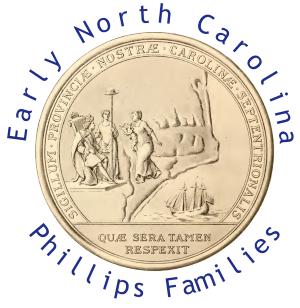Albemarle Settlements
From ENC Phillips Group Wiki
The Albemarle Settlements were the first permanent English settlements in what is now North Carolina, founded in the Albemarle Sound and Roanoke River regions, beginning about the middle of the 17th century. The settlers were mainly Virginians migrating south.
History
In 1653, the Virginia Assembly granted one Roger Green a tract of land on Roanoke River south of Chowan, to be located "next to those persons who have had a former grant." In 1662, George Durant purchased lands from the Indians in this region and there is evidence to indicate that others had done the same.
When it was learned that the Albemarle settlements were not included in the Carolina proprietary grant of 1663, a new charter was granted in 1665 which included them. A Government was instituted in Albemarle in 1664 and within a decade settlements extended from the Chowan River to Currituck Sound.
Bacon's Rebellion
During Bacon's Rebellion in 1676, the Albemarle Settlements offered assistance and refuge to the rebels. The rebellion's strongholds were mostly south of the James River, a region linked to the Albemarle Settlements by roads and rivers. A road linked "southside Virginia" to Edenton, North Carolina, skirting the edge of the Great Dismal Swamp. The Blackwater River of southside Virginia flowed south to the Chowan River, providing another link.
Rouges Harbor
The Albemarle Settlements came to be known in Virginia as "Rogues' Harbor".[1]
The boundary between Virginia and North Carolina was uncertain until a 1728 survey was done under William Byrd II, described in his book The History of the Dividing Line. Until then, many settlers did not know whether their lands were in Virginia or North Carolina.

